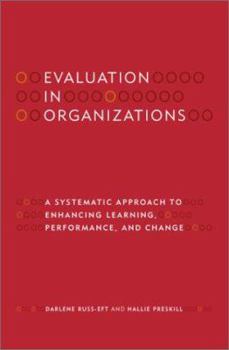Evaluation in Organizations a Systematic Approach to Enhancing Learning, Performance, and Change
Select Format
Select Condition 
Book Overview
From new product launches to large-scale training initiatives, organizations need the tools to measure the effectiveness of their programs, processes, and systems. In Evaluation in Organizations,... This description may be from another edition of this product.
Format:Hardcover
Language:English
ISBN:0738202681
ISBN13:9780738202686
Release Date:July 2001
Publisher:Basic Books
Length:496 Pages
Weight:0.70 lbs.
Dimensions:1.4" x 6.2" x 9.3"
Customer Reviews
3 ratings
The best book on Program Evaluation
Published by Thriftbooks.com User , 18 years ago
This text is a phenomenal resource on evaluating programs. This was a required text for a recent class that I was enrolled in for graduate school. It has all the information you would need regarding the background/context of evaluation, designing evaluations, and utilizing collected data. This book is also clear and concise. The greatest resource that I will use the most is the information on forming surveys and questionaires. There are a lot of great examples (of everything, not just surveys) throughout the book. It provides many contextual likert scale surverys. This will always be helpful to look back on because of the wordings and phrasings used in surveys. Creating an effective survey is extremely tough; but, with the help of this text, it can be a lot easier to both conduct and understand. The faculty member at my institution said that she agreed that this was the best book on the market for program evaluation. I tend to agree with her because it has a huge amount of information and it is easily accessible and easily referenced. It has some images and diagrams that are informative and moderately pleasant to look at. If you are going to be evaluating programs and don't know where to start or you just need some reference materials for creating surveys/questionaires then this book is for you. I could also see this book as a valuable resource for someone who is on the other end (having a program evaluated) simply for the fact that it will help with vocabulary/nomenclature when communicating with the evaluators.
Excellent "how-to" book on corporate evaluation
Published by Thriftbooks.com User , 21 years ago
Russ-Eft and Preskill have produced a first class book on evaluation that will be a constantly used reference on the bookshelf of any trainer, performance technologist or change agent who buys it. They begin with the history and theory of evaluation, presented in a very readable manner. Even their statistics section is easy to follow and apply! The section on the design and implementation of evaluations is packed with job aids, easy-to-apply tools and techniques, and guidelines on everything from running focus groups to sampling procedures. As a corporate evaluator I have been waiting for a book with this broad but in-depth coverage for years. Every aspect of the work of the evaluator is covered, and it is clear that the authors are both personally experienced in this field as well as widely read in the evaluation literature. Preskill and Torres' Readiness for Organizational Learning and Evaluation Instrument (ROLE) is generously included with instructions on administration and scoring, as well as an extensive bibliography for those who want to dig deeper into the subject of evaluation. This book is a must for those who are seriously committed to assessing the effectiveness and impact of interventions in organizations.
Cohesive, Comprehensive, and Cost-Effective
Published by Thriftbooks.com User , 22 years ago
The subtitle correctly indicates what Russ-Eft and Preskill's primary objective is: To present and explain "a systematic approach to enhancing learning, performance, and change" throughout any organization, regardless of size of nature. They succeed brilliantly. The material is presented as follows: Part I: Background and Context of Evaluation (Defining Evaluation; The Evolution of Evaluation; Evaluating Learning, Performance, and Change Initiatives; and The Politics and Ethics of Evaluation Practice)Part II: Designing and Implementing the Evaluation (Focusing the Evaluation; Selecting the Evaluation Design; Choosing Data Collection Methods; Observation and Archival Data; Surveys and Questionnaires; Individual and Focus Group Initiatives; Sampling; and Analyzing Evaluation Data)Part III: Maximizing Evaluation Use (Communicating and Reporting Evaluation Activities and Findings; Planning, Managing, and Budgeting the Evaluation; Evaluating the Evaluation; and Strategies for Implementing Evaluation in Organizations)The authors then provide a comprehensive audit mechanism (with specific directions) in an appendix to the three-phase system: "The Readiness for Organizational Learning and Evaluation Instrument (ROLE)" developed by Hallie Preskill and Rosalie T. Torres. For those in need ot supplementary resources, a substantial References section is also provided.Here is a brief excerpt: "Evaluation can be viewed as a catalyst and opportunity for learning -- learning what works and what doesn't work, learning about ourselves and the organization, and learning how to improve what we do in the workplace. As such, it can provide new understandings and insights into our programs, processes, products, and systems. Furthermore, evaluation can provide us with the confidence with which to make decisions and take actions that ultimately help employees and organizations succeed in meeting their goals." The authors agree with countless others that the future success of organizations will be dependent on their ability to build core competencies within a context of collaboration. They suggest that to develop support for evaluation as a knowledge-creating enterprise, "we must create a market for it. If we think about evaluation as a means for learning and attaining knowledge, then it becomes integrated into every organizational effort --from product development to program design to process reengineering to systemic change." They then suggest seven specific strategies when introducing or expanding evaluation practice. Throughout the book, they also include 60 Figures (e.g. "Guiding Principles for Evaluators") and three Tables (e.g. "Typical sections and contents of comprehensive written evaluation reports").Who will derive the greatest value from this book? Obviously, decision-makers in organizations in need of "enhancing learning, performance, and change." Presumably that includes all organizations. Also, I highly recommend this book to all consultants now inv




